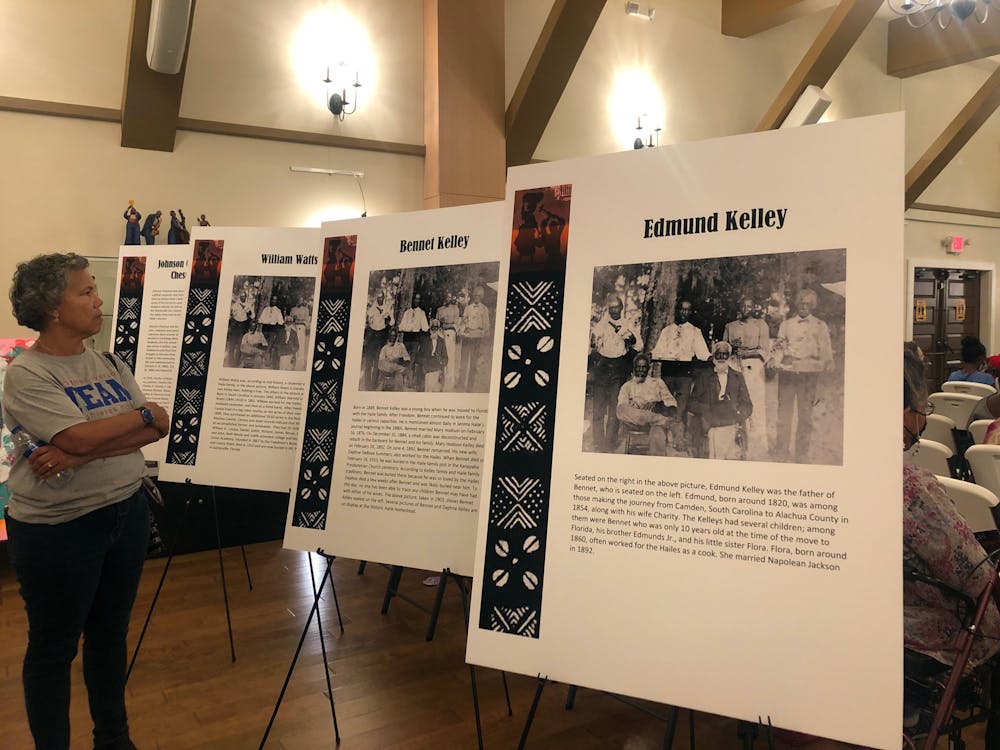Kenneth Nunn remembers a time when his late wife, Patricia Hilliard-Nunn, drove down country roads with a camera in hand searching for the names and personal stories of enslaved Africans in Alachua County.
“She invoked those names and said that it was important for them to be remembered and to be recognized,” said Nunn, a UF law professor.
The Cotton Club Museum and Cultural Center hosted “In the Shadows of Plantations: Enslaved Africans in Alachua County'' Oct. 14 to honor the research of Hilliard-Nunn, one of the pioneers of UF’s African American Studies department. About 75 Alachua County residents listened to a panel of speakers discuss the uncovered stories of enslaved people on local plantations and their contributions to the county’s development.
The museum serves as a resource for the Alachua County community to learn about African American history and culture, Nunn said.
Nunn also holds the title of Dr. Patricia Hilliard-Nunn memorial racial justice term professor, meaning that he will focus his research, teaching and service on racial justice during the term of this professorship.
Hilliard-Nunn was deeply involved in UF’s African American Studies department, a historian whose research exposed a deep history of lynching in Alachua County, especially the Newberry Six. She passed away in 2020.
The term enslaved Africans was used in favor of the word “slavery” to emphasize the humanity of the topic, Nunn said.
“She always talked about the importance of memory, about the fact that we’re dealing with people, human beings,” Nunn said. “They are not slaves, they are people.”
He presented findings from his late wife’s personal notes to the gathered onlookers.
“What we’re trying to do is recognize her work,” Nunn said. “And also provide a forum for some of the latest research that’s been done in that area to get presented.”
Hilliard-Nunn uncovered details in this subject that were otherwise overlooked in historical records, Nunn said, including the names and familial records of people enslaved on local plantations.
A gallery of information on the county’s plantations — including the Bailey, Dudley, and James Chestnut plantations among many others — filled the entrance of the presentation hall for visitors to weave through and read.
A display of vibrant African American cultural and historical artifacts, as well as remnants of slavery in Alachua County, adorned the Cotton Club’s walls. Attendees examined maps and old photographs before the panel discussion began, taking in this historical information.
Francesca Violich, a 67 year-old Gainesville resident, said she visited The Cotton Club because she felt compelled to learn about the work of Hilliard-Nunn.
“It’s a part of us, and we owe it to everyone to bear the burden of what happened before us,” Violich said. “It’s not fair to just have one group of our community hold that burden themselves.”
Violich’s message seemed to reflect the tone of the evening.
Kathleen Pagan, a 65 year-old Gainesville resident, said she recognizes the massive contribution enslaved people made to the county’s creation.
“We know how much work was accomplished using the labor of enslaved people,” Pagan said. “It’s important to recognize that and also to acknowledge the wrongs of having enslaved people.”
After Nunn spoke, a panel of four speakers presented their own research on the subject.
Karen Kirkman, president and historian of the Historic Haile Homestead, presented “No Longer Lost to Time: Emerging Stories of Enslaved People at Kanapaha,” which discussed the lives of enslaved Africans on Haile Plantation, a plantation that now refers to a planned community in southwest Gainesville.
Kirkman also shared names, jobs and familial connections of those who were enslaved.
“We have continued to grow in our knowledge of the enslaved people not only on this plantation, but the other Haile and Chestnut plantations as well,” Kirkman said.
Speakers Sherry Sherrod DuPree, Garlenda Greene-Grant and Patti Barlet each covered a portion of the presentation “The Role of African Americans on the Dudley Farm.”
Established during the Civil War by slave-holding plantation owners, Dudley Farm is now a historic state park spanning 325 of its original 640 acres.
Guests shared questions and comments after these presentations finished.
One commenter called for more contemporary conversations about Alachua County’s former plantations and the families that owned slaves. Multiple other attendees emphasized the importance of these stories and using specific language that humanizes the people forced to work on plantations.
Yvette Carter, a 50 year-old Gainesville resident, said she attended this event to learn more about the accurate past of Alachua County.
“It is American history,” Carter said. “It is not just Black history.”
Contact Rylan DiGiacomo-Rapp at rdigiacomo-rapp@alligator.org. Follow her on Twitter @rylan_digirapp.
Rylan DiGiacomo-Rapp is the enterprise environmental reporter and a third-year journalism and environmental science major. She has also worked as the metro editor, enterprise political reporter and metro news assistant. Outside of the newsroom, you can usually find her haunting local coffee shops.






